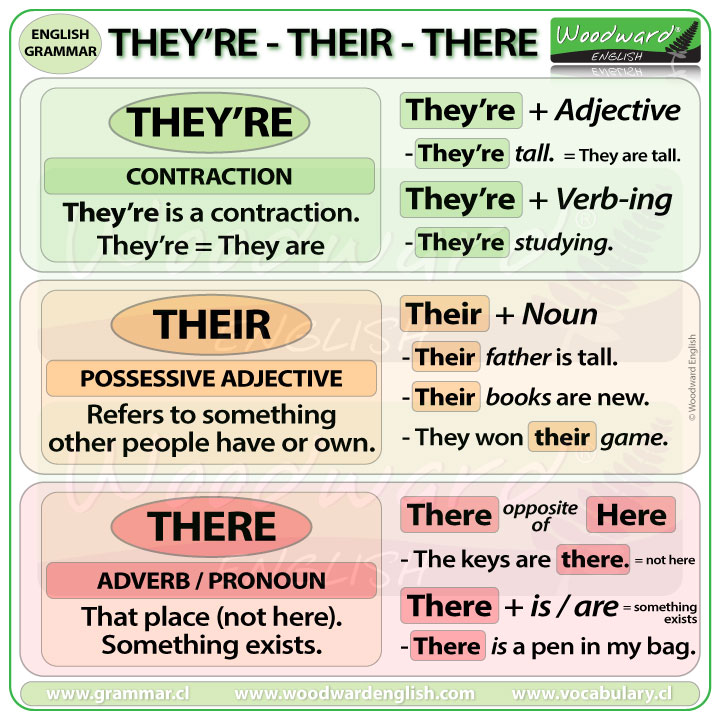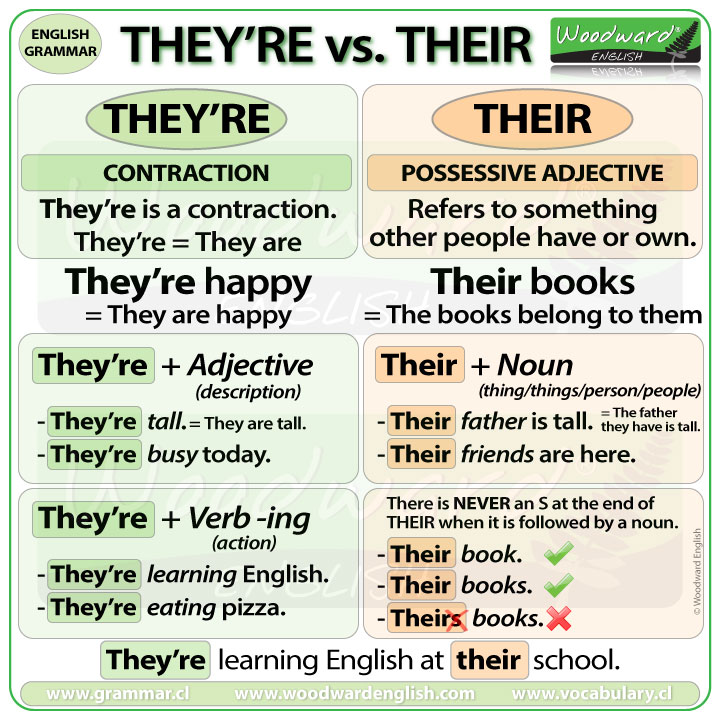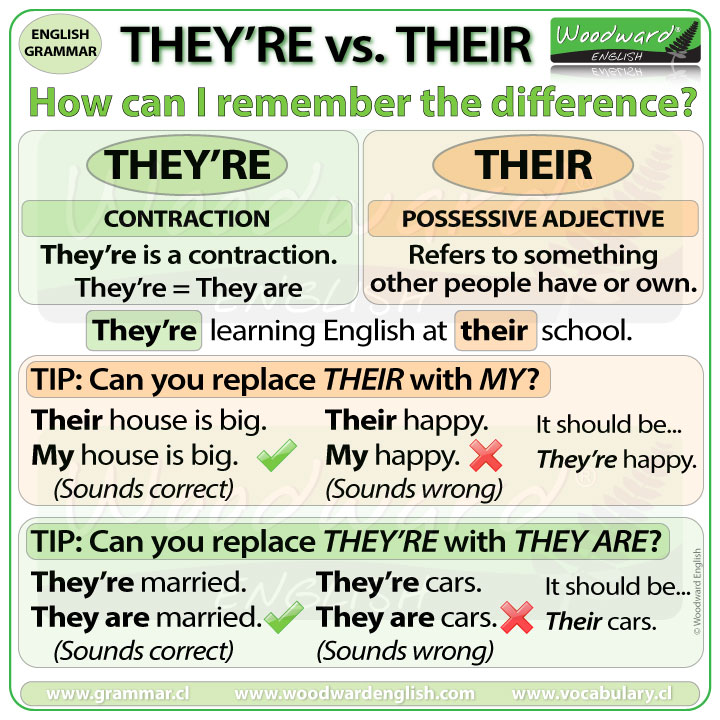What is the difference between THEY’RE and THEIR and THERE?
Their, They’re and There sound the same in English. Words that sound the same are called homophones. It is a common mistake to misspell these words in written English, even for native English speakers because they sound the same. However they have different meanings.
What is the difference between Their, They’re and There?
THEY’RE – Basic Explanation
THEY’RE = THEY ARE
They’re is a contraction of they are.
- They’re happy. (They’re here means they are … they are happy)
- They’re playing football.
- They’re in the other room.
THEIR – Basic Explanation
THEIR = a possessive adjective. It shows possession, that something belongs to some people you are not talking to right now.
Examples of other possessive adjectives are MY, YOUR, HIS, and HER:
My book, your book, his book, her book, their book.
- They have toys. Their toys are new.
- These are not my toys, they are their toys.
THEIR is used for a group of two or more people that are not with you right now.
- John and Mary are married. Their house is big.
- Mike and Steve are brothers. Their mother speaks Spanish.
- Their clothes are dirty.
- Their teacher is funny.
The noun after their can refer to a thing (or person) that these people have.
Mother and teacher are NOT possessions! They are something that you have.
THERE – Basic Explanation
THERE = Not here. In that place, not this place.
There is the opposite of here.
- A: Where are my keys?
B: Your keys are there on the table. (The table is not here… it is there) - I’m going to the beach this weekend. I will relax when I am there. (The beach is not here, it is there)
- A: I need to go downtown.
B: This bus will take you there.
THERE IS / THERE ARE = Something exists.
When THERE is followed by IS or ARE, then it means that something or some things exist.
There is + singular noun (or uncountable noun)
There are + plural noun
- There is a book on the table.
- There are books on the table.
- There is a guard next to the door.
- There are many people in the room.

THEY’RE, THEIR and THERE in the same sentence
Look at this example:
- They are reading their books over there. (Their is a possessive adjective … they are not my books, they are their books)
In this sentence, we can replace They are with the the contraction They’re.
- They are reading their books over there. =
- They’re reading their books over there.
Where are they reading their books?
They are not reading there books here. They are reading their books over there.
This is an example of They’re, Their and There in the same sentence:
Can you see the difference?
The first THEY’RE is a contraction of THEY ARE … the second THEIR is a possessive adjective (showing they have something) and the third THERE refers to the place they are reading which is not here.
MORE DETAILS…
How do we know when to use THEIR or THEY’RE?
It depends on the next word or words.
THEIR + NOUN
We use Their + Noun (usually a thing or person/people)
- They have a car. Their car is new.
- They took their surfboards to the beach.
- The students put their homework on the teacher’s desk.
NOTE: There is no article before the noun.
- Their
afriend is here. (Not correct) - Their friend is here. (Correct)
Sometimes there is an adjective before the noun.
- Their crazy friend is here. (Correct)
IMPORTANT: we do NOT add an S to the end of their with plural nouns.
- Their books. (CORRECT)
- Theirs books. (WRONG)
THEY’RE + ADJECTIVE (description)
They’re = They are … is often followed by an adjective.
- They’re angry. (= They are angry … angry is an adjective)
- They’re busy today.
- Look at those giants. They’re very tall.
THEY’RE + VERB-ING (an action)
They’re = They are … can be followed by a verb ending in -ING.
- They’re eating pizza.
- They’re watching a movie right now.
- They’re learning these grammar rules.
THEY’RE + PLURAL NOUN
They’re = They are … can also be followed by a plural noun.
- They’re painters. (painters is a noun)
- They’re great painters. (There can be an adjective before the noun)
More examples of THEY’RE vs. THEIR
Can you see the different uses?
- Where is their teacher?
- They’re learning English at their school.
- They’re tired right now.
- Their breakfast is ready.
- They’re happy their friend won the race.

How can I remember the difference between THEY’RE and THEIR?
1. Replace THEIR with MY.
If it sounds correct then THEIR is correct.
If it doesn’t sound correct, then you need to use THEY’RE.
THEIR house is big.
MY house is big. (Sounds CORRECT)
THEIR happy.
MY happy. (Sounds WRONG) … It needs to be THEY’RE happy.
2. Replace THEY’RE with THEY ARE.
If it sounds correct then THEY’RE is correct.
If it doesn’t sound correct, then you need to use THEIR.
THEY’RE married.
THEY ARE married. (Sounds CORRECT)
THEY’RE cars.
THEY ARE cars. (Sounds WRONG) … It needs to be THEIR cars.
The difference between They’re, Their and There is a common mistake even for native speakers in written English so don’t worry if you find this difficult at the beginning.
